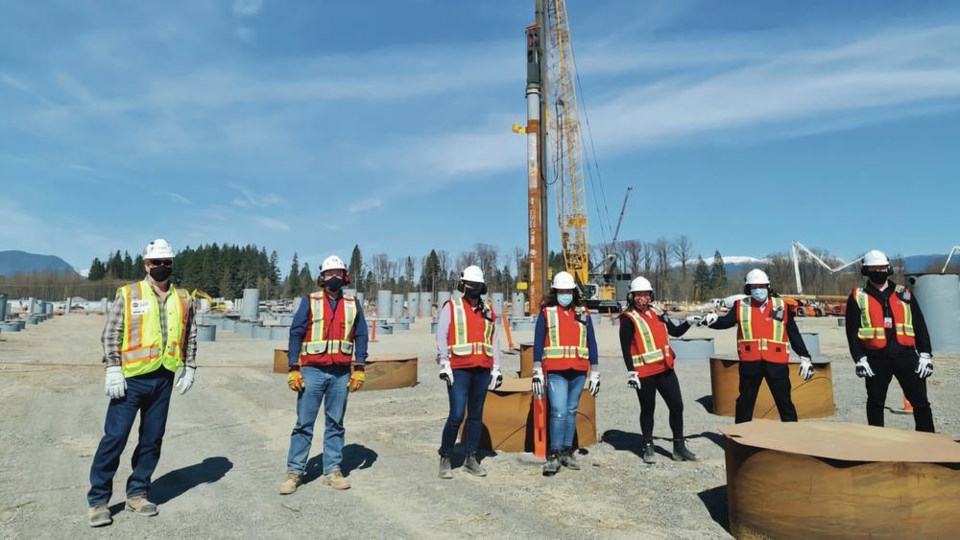If you have used the Tsawwassen ferry Âterminal this past week, chances are you will have seen a large billboard asking “How healthy is natural gas?” and pointing you to a website — unnaturalgas.org.
The billboard and website are the work of the Canadian Association of Nurses for the Environment (CANE) and the ÂCanadian Association of Physicians for the ÂEnvironment (CAPE). I am proud to say that, about 30 years ago, I was one of three Âco-founders of CAPE and for some years was chair of the board.
The billboard is part of their campaign to raise concerns about the health effects of so called natural gas.
Interestingly, Âattaching the term “natural” to gas seems to have resulted from the fact that, originally, much of the gas used as fuel in the 19th and early 20th centuries — think of Victorian gas-lit streets and parlours — was manufactured by “gasifying” coal. As a child growing up near London, I can recall the local Âgasometer where this gas was stored — and I can remember the smell.
In contrast to manufactured gas, natural gas — which was known of centuries ago — was found as a naturally occurring Âsubstance underground.
But it did not begin to be widely exploited until the 20th century, eventually displacing manufactured gas.
Of course, the term “natural” was a boon to those marketing gas. Attaching the word “natural” to a product always makes it sound better — wholesome, good for you. But Âcalling something natural doesn’t make it good — arsenic and mercury are natural, but also dangerous, harmful to our health.
In reality, natural gas is just another Âfossil fuel, as natural as coal or oil, although it burns more cleanly and with lower Âgreenhouse gas emissions (GHG). But it is 95 per cent methane, and methane has about 80 times the climate-changing potential of carbon dioxide.
So while it is not a problem when burned, because that destroys the methane, Âcreating mainly carbon dioxide and water, it is a big problem if it is unintentionally released Âduring its production, processing, storage and transportation — so-called fugitive emissions.
In fact, the latest report of the ÂIntergovernmental Panel on Climate Change, released on Aug. 9, drew particular attention to methane, with Panmao Zhai, chair of the working group that wrote the report, noting: “Limiting other greenhouse gases and air pollutants, especially methane, could have benefits both for health and the climate.”
Here in saąúĽĘ´«Ă˝, according to the Âgovernment’s own GHG Inventory, Âfugitive emissions from the oil, coal and gas Âindustries released the equivalent of 4.3 million tonnes of CO2 in 2018, more than six per cent of all emissions. ÂThree-quarters of those fugitive emissions came from the gas sector. But a July 2021 article in ÂEnvironmental Science and Technology, by two Carleton University scientists, Âsuggested the emissions from the oil and gas sector in northern saąúĽĘ´«Ă˝ are really about Âdouble what is being reported.
Moreover, about 70 per cent of the gas saąúĽĘ´«Ă˝ produced in 2018, and about 70 per cent of our gas reserves, are “unconventional” — tight gas, shale gas or coalbed methane — according to a January 2020 report from CAPE on the health and climate effects of fracked gas. That means they need unconventional extraction, namely fracking — and there is nothing natural or healthy about the fracking process.
So when you hear government and industry talk about liquefied natural gas (LNG), you should do an edit in your head — it’s actually liquefied fracked gas (LFG). Fracked gas, as CAPE and CANE note, “is a health hazard — for families in saąúĽĘ´«Ă˝ who live beside the LNG-fracking industry that produces it, for people who burn it in their homes and for the climate change that is devastating our planet.”
CAPE and CANE are calling for a Âmoratorium on fracking expansion, support for a just transition for workers moving in to the new clean-energy economy, investments in zero-emissions buildings and the banning of natural gas hook-ups in all new buildings by 2023, and the ending of all fossil-fuel Âsubsidies.
You can learn more at the Unnatural Gas website mentioned earlier, where you will also find a link to enable you to sign on to their letter to Premier John Horgan.
Dr. Trevor Hancock is a retired professor and senior scholar at the University of ÂVictoria’s School of Public Health and Social Policy.



